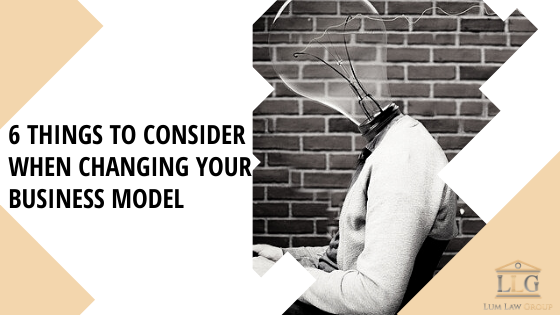How Do I Change My Business Model for COVID-19?
As California businesses have slowly been allowed to reopen, many business owners are not sure if they can continue as they have. Whether it’s due to the new COVID-19 restrictions for their industry, or fears as to whether customers consumption appetite has changed, business owners are now taking time to analyze how the pandemic will continue to affect their business. If you are a business owner concerned with whether you can continue your existing business model under the “new normal”, we can help. Not only are we able to advise you on your business and the possible implications of reopening, but we have also compiled a list of points to consider if you want to change your business model.
1. Legal Entity Type
If you’ve already determined that your current business model will not be sustainable in the long run, and have already decided to change it, then there are legal issues to consider. The first is whether you can continue to operate the business with its current legal entity type. An experienced business attorney can be of help in making this decision, for if your current legal entity type is unsuitable for your new business model, you will need to establish a new business entity.
If you do need to establish a new business entity, you’ll have to figure out what type of business entity is more suitable than your existing one (and why!) Finally, you’ll have to decide on the relationship between your existing business entity and the new one, for example, it could be a subsidiary, or “sister”, company.
2. Employment Law Compliance
Once you’ve outlined your new business model, the type of legal entity it requires, you’ll need to see whether there are additional labor laws associated with this new model. If, for example, you’ll be hiring remote workers instead of in-office workers, you may need to consult state and federal employment laws regarding the physical location of your employees. Don’t make drastic changes without verifying your business is in compliance with existing laws.
Be sure to update your human resources department, or employee guides to reflect changes required by your new business model.
During the COVID-19 pandemic, you also want to keep up-to-date with current and upcoming changes to pandemic-related employment laws, such as the Family First Coronavirus Response Act.
3. Contracts
Before making a pivot, see that the change in business model and activities do not break any existing contracts you have that may limit competition (e.g. non-competition clauses in certain industries). Have a contract attorney check your existing contracts before making the final leap.
Finally, before executing new contracts, consider adding provisions that may help with the COVID-19 situation, such as termination clauses.
4. Permits
When planning your business pivot, verify that you have all the permits necessary for the new business model to operate. Also, consider if there are any regulations that may now affect your business due to the change, such as online marketing restrictions (FTC regulations).
5. Data Privacy
If your business is going online for the first time, it might be important to familiarize with data privacy laws, especially regarding the safety of your website and regulations regarding personal identifiable information (PII).
6. Intellectual Property
Generally there are two types of intellectual property issues a new business model may trigger, the first is licensing for music or other property used in media (e.g. podcasts, videos), and the second is trademarks for your new logo, etc. Read on for why you need to protect your intellectual property.
As we gradually transition from quarantine to the new post-coronavirus “normal”, we all have to consider new ways of doing things for our small businesses. If we, at Lum Law Group, can be of any assistance in helping your business survive the pandemic, please contact us and we would be happy to be of assistance.

